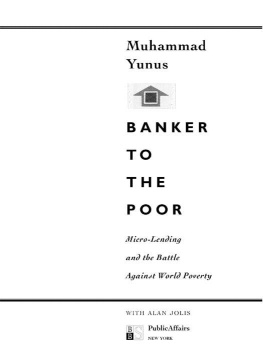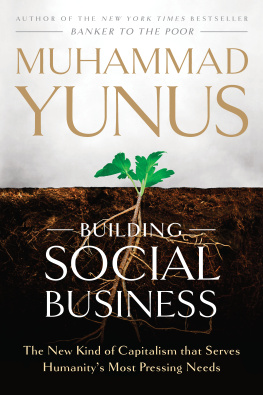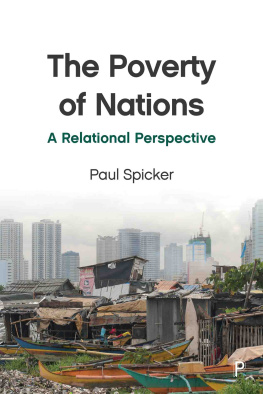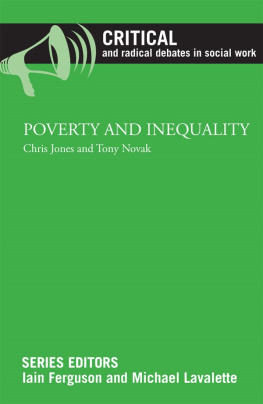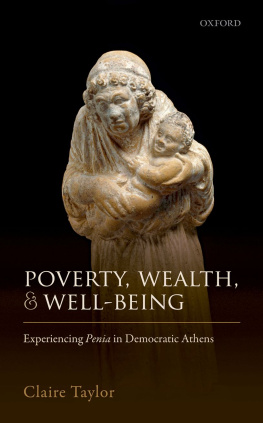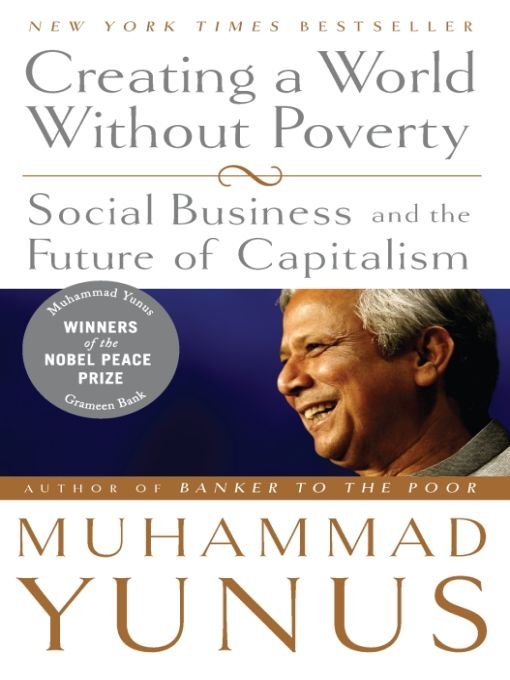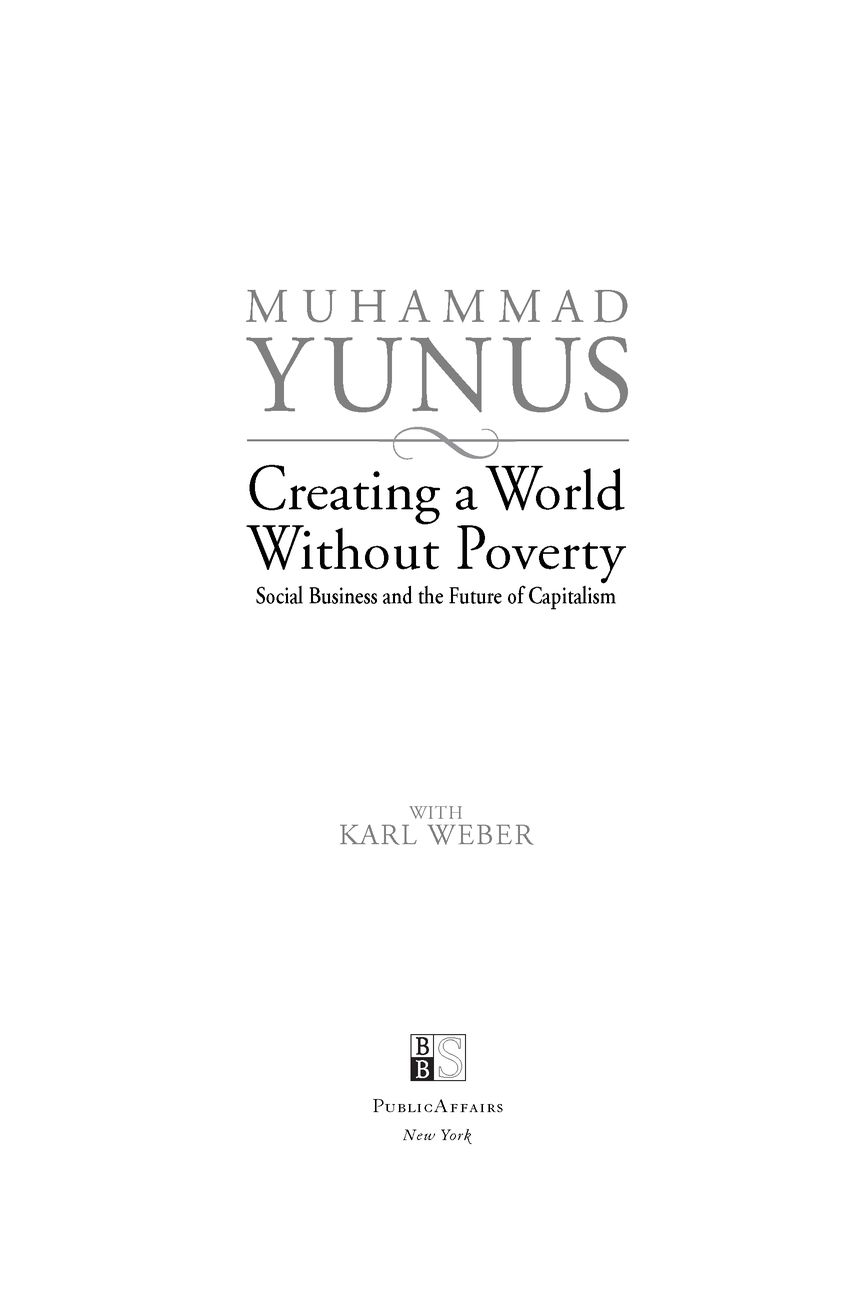Table of Contents
Praise for
Creating a World Without Poverty
In corporate circles, the double bottom linereaping profit and doing social goodis all the rage. Muhammad Yunus... says we should go further. In Creating a World Without Poverty, he sketches out a new type of company, one that exists only to better peoples lives.
Barbara Kiviat, Time
[Creating a World Without Poverty] succeeds in imparting the optimism that allows Yunus to keep struggling against the overwhelming forces arrayed against the Bangladeshi poor. By unlocking the potential of the overlookedpoor mothers, uneducated beggars, migrant laborershe has shown himself to be one of Mohandas Gandhis unlikely heirs.
Austin-American Statesman
Part seer, part George Bailey from Its a Wonderful Life, Mr. Yunus weaves a narrative brimming with promise and common-sense logic.
David Cotner, Santa Barbara News-Press
In this excellent work of popular economics, he tells the story of how he came to the idea and the impressive results it has generated.
Winnipeg Free Press
An inspiring volume, full of practical information for people who are motivated to try out his ideas.
Business Week
[I]n Creating A World Without Poverty, Nobel Peace Prize winner Muhammad Yunus argues convincingly that social business is an achievable way of exploiting capitalism to help the poor. Yunus moves the debate beyond the tired argument that the rich should simply donate to those less privileged, and demonstrates that the free market can in fact be used to the advantage of the less well off... This book is a must-read for policymakers or philanthropists, and its conversational style and straightforward logic also make it appealing to the layperson.
Scotland on Sunday
Its not just Yunus theories [Peter] Drucker would have admired; above all, its his effectiveness... See for yourself. Check out Yunuss new book and, if you missed it, his first: Banker to the Poor. Not only are they inspirational, they are highly informationalfantastic case studies on how to manage a business the right way.
Rick Wartzman, Business Week
Part economics text and part inspirational story of a successful entrepreneur, Yunus tells how, having convinced himself of the need for a bank to provide micro loans to the very poor, he stopped at nothing to make it happen. All in all, its an inspirational book for anyone keen to understand the economic arguments and principles that underpin social business.
Director
Infused with entrepreneurial spirit and the excitement of a worthy challenge, this book is the opposite of pessimistic recitals of intractable povertys horrors.
Publishers Weekly
The world of social business is one where the individual is concerned with more than profit alone. But how can free-market, capitalist principles be applied to concerns such as poverty, homelessness and protecting the planet, within a corporate environment? Winner of the 2006 Nobel Peace Prize, Muhammad Yunus offers a business model that can, and tells of those companies that already have.
Publishing News (UK)
The influential economist and winner of the 2006 Nobel Peace Prize outlines his vision for anew business model that combines the power of free markets with the quest for a more humane world. Includes stories of companies that are already doing social business.
Bookseller (UK)
In Creating A World Without Poverty, Nobel Peace Prize winner Muhammad Yunus argues convincingly that social business is an achievable way of exploiting capitalism to help the poor. Yunus moves the debate beyond the tired argument that the rich should simply donate to those less privileged, and demonstrates that the free market can in fact be used to the advantage of the less well off.
Poverty News Blog
Also by Muhammad Yunus
Banker to the Poor
To everyone who wants
to create a world
where not a single person is poor
Prologue
Starting with a Handshake
Because the microcredit organization I founded, Grameen Bank, has successfully brought financial services to poor women in Bangladesh, I am often invited to speak with groups that are interested in improving the lot of women. In October 2005, I was scheduled to attend one such conference in the French resort town of Deauville, ninety miles northwest of Paris. I would also be visiting Paris to deliver a lecture at HEC, one of the leading business schools in Europe, where they would honor me with the position of Professor Honoris Causa.
A few days before my trip to France, the coordinator of my schedule in Paris received a message from the office of Franck Riboud, the chairman and CEO of Groupe Danone, a large French corporation (whose American brand name is Dannon). The message read:
M. Riboud has heard about the work of Professor Yunus in Bangladesh, and he would like very much like to meet him. Since he will be traveling to Deauville shortly, would it be possible for him to have lunch with M. Riboud in Paris?
I am always happy to meet with people interested in my work in general, and in microcredit in particular, especially if they can help in the battle to alleviate and ultimately eliminate global poverty. The chairman of a major multinational corporation would certainly be worth talking to. But I was not sure whether the proposed meeting could be accommodated in my already packed schedule. I told my coordinator that if we could find the time, I would be happy to see M. Riboud.
Dont worry, I was told. The Danone people will make all the arrangements, take you to lunch, and then make sure youre delivered to the HEC campus in plenty of time.
So on October 12, I found myself being whisked from Orly airport in a limousine provided by the Danone corporation to La Fontaine Gaillon, a Parisian restaurant recently opened by the actor Grard Depardieu, where M. Riboud was waiting for me.
Hed brought along seven of his colleaguesimportant executives in charge of various aspects of Danones global business: Jean Laurent, a member of the board of Danone; Philippe-Loc Jacob, general secretary of Groupe Danone; and Jerome Tubiana, facilitator of Dream Projects in Danone. Also present was Dr. Bndicte Faivre-Tavignot, professor at HEC in charge of their MBA program in sustainable development.
I was ushered into a private room where I was greeted in a very friendly fashion, served a fine French meal, and invited to tell the group about our work.
I quickly discovered that Franck Riboud and his colleagues were well aware of the work of Grameen Bank. They knew we had helped launch the global movement called microcredit, which helps poor people by offering them small, collateral-free loansoften as little as the equivalent of thirty to forty U.S. dollarsto use in starting tiny businesses. Access to capital, even on a tiny scale, can have a transforming effect on human lives. Over time, many of the poor are able to use the small stake that a microloan provides as the basis for building a thriving businessa tiny farm, a craft workshop, a little storethat can lift them and their families out of poverty. In fact, in the thirty-one years since I began lending money to poor peopleespecially womenmillions of families in Bangladesh alone have improved their economic circumstances with the help of microcredit.


